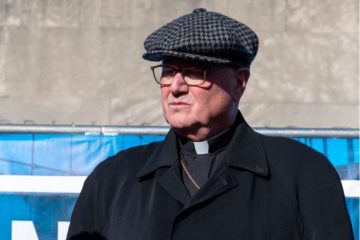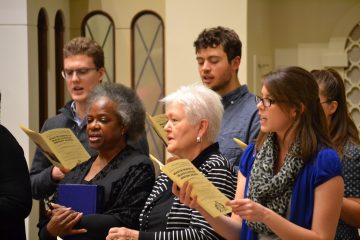Little Sisters in court: Don’t stop our ministry of serving the dying poor

By Mary Rezac CNA/EWTN News
DENVER, Colo. — The Little Sisters of the Poor asked an appeals court Monday to shield them from the federal contraception mandate, saying that it threatens their 175 years of service to the poor and dying.
“As Little Sisters of the Poor, we offer the neediest elderly of every race and religion a home where they will be welcomed as Christ, cared for as family and accompanied with dignity until God calls them to Himself,” Mother Loraine Marie Maguire told members of the press.
“But now the government demands we choose between our care for the elderly poor and our faith. We cannot do that and we should not have to.”
Mother Maguire’s comments came after the 10th Circuit Court of Appeals listened to oral arguments in the Little Sisters’ lawsuit against the HHS Mandate in Denver.
The oral arguments fell on Dec. 8, the feast of the Immaculate Conception, a special day for the religious community.
“Little Sisters around the world renew their vows each year on the feast of the Immaculate. Please be assured of our prayers for you on this beautiful feast day,” a note on their website reads, which also asks for prayers for the success of the lawsuit.
Over a year ago, the Little Sisters of the Poor, aided by the Becket Fund for Religious Liberty, filed a lawsuit challenging the federal contraception mandate under the Affordable Care Act, which requires employers to offer health insurance plans covering contraception, sterilization and some drugs that may cause early abortions.
Amid religious freedom concerns, the Obama administration revised the initial mandate, allowing religious employers such as the Little Sisters to sign a form that would trigger a separate health benefit provider to offer the coverage instead.
The Little Sisters object that they cannot in good conscience sign the form because it authorizes a third-party insurance company to provide the very products and procedures they believe to be gravely immoral.
“What the government has done, and it’s a strange thing to do, is say, ‘The only way we’ll accept your objection is if on the same piece of paper saying ‘I object’, you modify the plan to give someone else the authority to give out contraceptives on the plan,” said Mark Rienzi, senior counsel for the Becket Fund for Religious Liberty, at a press conference following the oral arguments.
Should the Little Sisters of the Poor lose their case and still refuse to sign the form, they would be faced with massive fines amounting to around $2.5 million a year, or around 40 percent of the $6 million the Sisters beg for annually to run their ministry.
“…the government forces us to either violate our conscience or take millions of dollars that we raise by begging for the care of the elderly poor and instead pay fines to the IRS,” Mother Maguire said.
Flanked by four of her fellow sisters, Mother Maguire gave a statement at the press conference expressing the Sisters’ desires to receive an exemption in order to avoid massive fines and to continue to work with the elderly poor, as they have in the United States for 175 years.
The Little Sisters of the Poor lawsuit is a class action lawsuit involving almost 500 other Catholic nonprofit organizations that receive health benefits through the Christian Brothers Employee Benefit Trust and Christian Brothers Services.
“The sisters’ view is, ‘I can’t create a situation where someone has a legal obligation to give out contraceptives,’” Rienzi stressed.
He said that if the government would choose to pursue ways of distributing contraceptives other than through the Little Sisters’ health care plan, then the sisters could go back to their ministry undisturbed.
Currently, Title X health centers provide contraceptive services to low income men and women independently of health plans.
“The government can put a man on the moon, and they can put mail in my mailbox every day,” Rienzi said. “They can certainly get contraceptives to people they want to get them to, without the intercession of Catholic nuns.”
He emphasized that the Becket Fund and the Little Sisters are prepared to fight this case all the way back to the Supreme Court, which granted the Little Sisters a temporary injunction on Jan. 24 of this year.
But he is hoping they won’t have to, pointing out that precedent seems to be on their side. The Supreme Court has already granted exemption to employers that object to the mandate, including Hobby Lobby.
“We either need the court to get it right, or we need the government to see the light and say, ‘Hey we don’t need to go hassling nuns, we’ve got bigger problems to deal with in the world than chasing the Little Sisters.’”
Posted Dec. 9, 2014













![The night is advanced, the day is at hand. Let us then throw off the works of darkness [and] put on the armor of light Romans 13:12 Rorate Mass Old St Mary (CT Photo/Greg Hartman)](https://www.thecatholictelegraph.com/wp-content/uploads/2018/12/DSC_0569a-165x116.jpg)